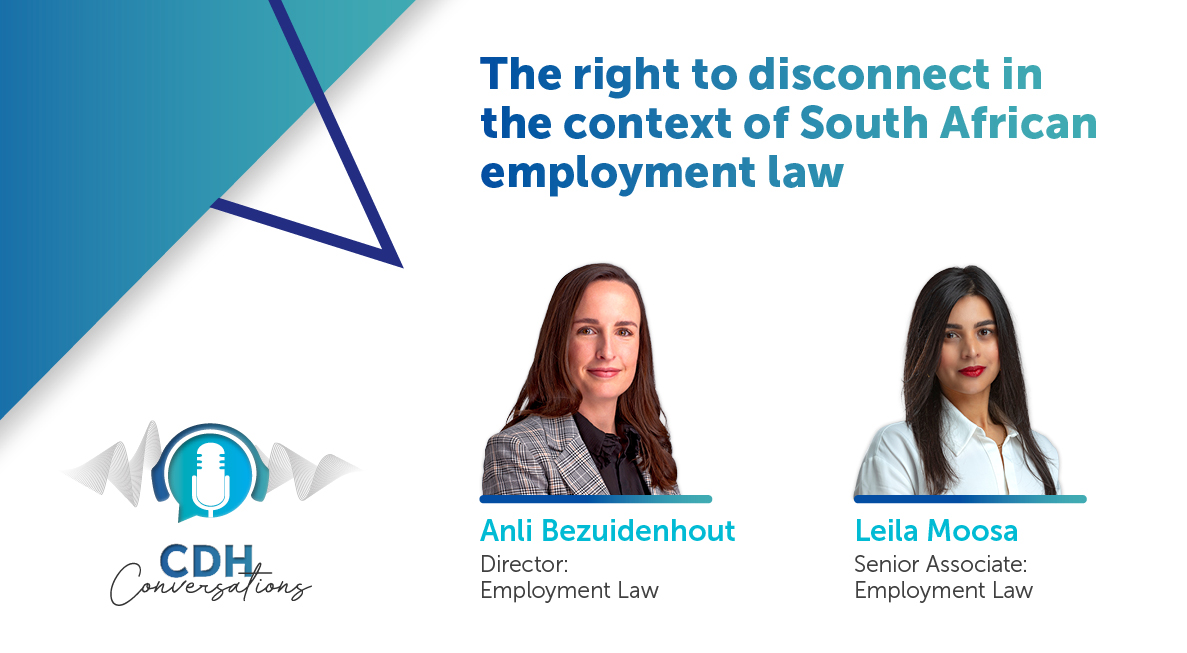Safeguarding your good name: A podcast on defamation
At a glance
- Defamation is a civil wrong (delict) harming a person’s reputation, with legal remedies including apologies, retractions, interdicts, and damages claims.
- Courts consider the seriousness of statements, their reach, prior reputation, and remorse when deciding on defamation remedies.
- Key defences to defamation include truth and public interest, fair comment, media privilege, qualified privilege, sudden anger, jest, and the SLAPP defence.
- Victims should carefully assess whether suing is wise, as litigation can amplify publicity and potentially cause more reputational harm.
- Legal action should follow calm analysis, not impulsive retaliation, weighing all facts and consequences before proceeding.

Safeguarding your good name: A podcast on defamation
Podcast
Safeguarding your good name: A podcast on defamation
Podcast
Luke highlighted that asking for an apology or retraction might save time and costs. If this fails, one can rely on interdictory relief, a claim for damages or both. Elham highlighted various defences available to the defaming party and the requirements which he/she needs to fulfil to be successful with each defence. Tim concluded by highlighting that if someone is trying to provoke you, it is often best to keep quiet and ignore the person. However, deciding on the best approach will require a complete analysis of the facts. One should not react without thinking about the situation thoroughly.
Click here to listen to the discussion.
Transcript
Tim Fletcher: Welcome to the CDH Conversations podcast. Today we are going to be having a chat about defamation. On the one hand, in the constitutional era, free speech is more protected than ever, but we also in the age of social media, where substantial damage can of course be caused in seconds. I'm joined on this podcast by Luke Kleinsmidt and Elham Shaik, both from the Dispute Resolution Department at Cliffe Dekker Hofmeyr, to talk about what constitutes defamation to explore potential defenses to a defamation claim, and also to look at strategies that should be considered.
When dealing with defamation. So let me hand over to Luke.
Luke Kleinsmidt: Thanks Tim, defamation is a civil wrong, what lawyers call a delict, with serious consequences. Many people may not know how much trouble you can get into by publishing something defamatory about someone. To avoid sounding like a textbook voiceover, let's talk about what is less commonly known about defamation and the practicalities thereof.
Now everyone has the right to a good name. If your character's been wrongfully unintentionally attacked and your good name has been damaged, there are various remedies at your disposal to protect these rights. You may be eager to immediately sue someone for defamation if your character's been attacked.
While I completely understand this frustration before formally instituting litigation proceedings against an individual, you may want to consider writing a letter asking for a formal apology or a retraction. Very often a lawyer's letter and the mere threat of legal action may scare an individual into retracting any defamatory publications.
This may save you a lot of time and money, and if this fails and the harm continues or no response is received, then you may want to institute legal proceedings. In this regard, you may seek damages, interdictory relief or both. And if you're successful, you can also claim back your legal costs. And there are specific prescribed court tariffs. We won't get into that, but you can claim back your legal costs if you're successful or part thereof.
You're going to want to stop the defamation as soon as possible and prevent any further harm from being done. This can be done by Interdictory Relief, which is instituted by way of an application. Now, depending on the circumstances of the specific defamation that you or your client have faced, you can institute these proceedings on an urgent basis and being caught within two weeks as long as you can justify the urgency, and the main aim of this type of relief is to prevent further damage or further defamatory publications being published and prevent further harm. Then to claim back any losses suffered by the defamatory publications such as losing potential clients drop in revenue, or whatever the case may be, you can institute a damages claim against the defaming party, which will be instituted by way of summons. This is for financial compensation, and you'll have to prove an actual loss.
The court generally has a wide discretion in these circumstances and will assess the [00:03:00] amount to determine if it's fair and plausible. The court will also apply an objective test, and in most cases, damages awarded are relatively small, but it'll depend on the circumstances. If the damage has been done, there's no one undoing it and no prospect of any further harm, then an interdict might not be necessary.
If there's no prospect of recovering damages or the prospects for claiming damages for whatever reason is bleak, then one might only wish to proceed with an interdict. While most people will seek to go one way or the other, depending on the specific circumstances, one can seek both remedies. If you want to prevent further harm and you want to claim damages, by all means institute both.
When considering whether to grant an interdict or when deciding a damages claim, the court will generally look at factors such as the seriousness of the statement, the reach or audience at the publisher's disposal, the reputation of the defamed person before the publication, and whether the defaming party expresses any remorse if they're sorry.
This is just a broad overview of what court proceedings may look like if you institute defamation proceedings against someone. The specific circumstances around defamation will always be different on a case by case basis, but you're always entitled to protect your rights.
Elham, will you tell us a bit more about any special defenses available to the party making the statement that is alleged to be defamatory?
Elham Shaik: Thanks, Luke. So when instituting defamation proceedings, it's important to note that once you have proved that the defamatory statement was published, there's a presumption that the defaming party willfully and knowingly intended to defame you. The responsibility lies on the defaming party to contest this presumption.
They may use the following defenses to do so. Firstly, the defaming party may rely on a denial of defamation if they can prove that while the publication might seem to be defamatory, the statements will remain in a non-defamatory sense in that they were special circumstances that justified the defamatory statement.
If a person makes a remark which can be proven to be substantially true and to the benefit of the public, then the defaming party can use the defense of truth and public interest, which protects remarks made that were substantially true. In every material part of the statement and in the best interest of the public.
This generally lies in the publication of true statements that inform the public of matters that they were unaware of and are in their interest to know. If the information is already public knowledge, then the argument claiming public interest will be more difficult to prove. If, however, the statement itself was not necessarily true, but was based on facts that are true.
And in public interest, then the defaming party can raise the defense of fair comment. To successfully raise this defense, the defaming party has to prove that the defamatory statement amounted to a comment or opinion of fact. The comment was fair, which will be determined based on the context in which the comment was made and the convictions of the community, and it must not have been made out of malice.
The facts on which the comment is based are true facts and the facts are in public interest. However, the defense or fair comment will fail if the defame party can prove that there was malice or improper motive behind the publication. The defense of public media privilege provides an exemption to a member of the public media allowing publication of statements that are reasonable.
Even if those statements might damage someone's reputation because of the context in which they were made, the defaming party must allege and prove that they have reason to believe that the statement was true. And that they took all necessary steps to verify that the information is true and that the publication was therefore reasonable.
The defense of qualified privilege may be used when defamatory words were published when exercising a duty or right, or where the receiver of the information has a duty or right to receive the information or statements. An example of this would be during litigation in official court proceedings, the defense of qualified privilege may be used where the defamatory statements are supported on reasonable grounds.
A court will apply what is known as the reasonable person test. If the defaming party cannot prove that the statement was pertinent or relevant to the facts, this events will be dismissed and the statement will be considered defamatory. The defamed party may also rebut. This defense by arguing that the statement was published with ill intent or that it had no basis and was irrelevant to the issues at hand.
And finally, the SLAPP defense. This may be used if a defaming party can prove that the defamation claim, whether for an interdict or damages or both brought by the defame party, is an abuse of court process is not brought to protect or [00:08:00] vindicate a right, amounts to using the court to achieve improper ends, to silence the defaming party and to cause the defaming party, financial or other prejudice, and it violates the right to freedom of expression in a material way alongside other rights in the Bill of Rights.
It should also be noted that the argument of sudden anger, jest and provoking behavior by the defame party are also defenses available to the defamation claim. Tim, can you please explain to us the practical implications of a defamatory case?
Tim Fletcher: Sure. Thanks Luke and Elham. So defamation is a tricky subject because the knee-jerk reaction of someone whose reputation has been attacked is to hit back and to bring a defamation claim either by way of an interdict or damages or both.
So let's just start with the press. If you're thinking of going after the press, either by way of interdict or damages, it's very good to remember Mark Twain's words when he said that you should never pick [00:09:00] a fight with people who buy their ink by the barrel. The risk of fighting with the newspaper is that if you lose, you can expect that results to be on the front page of the newspaper the next day.
The same point is worth remembering generally when considering whether or not to bring proceedings for defamation. Sometimes if you're looking to protect your good name, the best way of doing that is ignoring the person who defamed you. If you sue them, the story of what they said to you at the general meeting of your local chess club may become national news, and by issuing summons, you have created the very kind of bad publicity that you wanted to avoid.
So when you're dealing with someone who is trying to provoke you, whether they are an internet troll or someone perhaps out to get publicity for themselves, for whatever reason, you sometimes you might be best keeping quiet. Often the defamatory statements are made with the intention of drawing you into a public fight.
And counterintuitively, the best approach might be to ignore that person. If you've correctly identified them as a bully looking for attention, your silence will deprive them of that attention and they will lose interest and move on to their next mark. So deciding on the best approach to a defamatory attack is difficult, and it requires a complete analysis of all the relevant facts, including facts about the person who is perpetrating the defamation and the potential consequences, including legal costs and wasted time working with lawyers.
Going to court can be time consuming. It can be risky. It's certainly expensive, but there are certainly circumstances where that is the correct approach. But rushing to court without a clear plan is very unwise. A good rule of thumb that I often use in these circumstances is that you should act never react. By that I mean that you should not be retaliating. Instead, you should have thought about the situation and decided with a cool head what you want to do. If you act, what you decide to do is then not dictated by the person who has defamed you. So just bringing this all together, understanding defamation requires an understanding of the delicate balance between what should be protected as freedom of speech and where someone has gone too far.
Even if it is clear that someone has gone too far, deciding whether the exercise of your legal rights and taking the matter to court is a good thing is also not an easy decision and a decision that should only be taken after careful thought, and as I've said, examination of all of the facts. Thank you for listening.
The information and material published on this website is provided for general purposes only and does not constitute legal advice. We make every effort to ensure that the content is updated regularly and to offer the most current and accurate information. Please consult one of our lawyers on any specific legal problem or matter. We accept no responsibility for any loss or damage, whether direct or consequential, which may arise from reliance on the information contained in these pages. Please refer to our full terms and conditions. Copyright © 2026 Cliffe Dekker Hofmeyr. All rights reserved. For permission to reproduce an article or publication, please contact us cliffedekkerhofmeyr@cdhlegal.com.
Subscribe
We support our clients’ strategic and operational needs by offering innovative, integrated and high quality thought leadership. To stay up to date on the latest legal developments that may potentially impact your business, subscribe to our alerts, seminar and webinar invitations.
Subscribe




